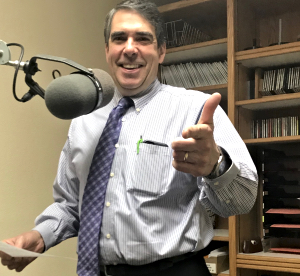
Our thanks to Rod Schwartz for introducing us to Dr. James DeVleming, an optometrist in Pullman, WA. DeVleming has been doing a series of informational features called “Ask Dr. DeVleming” on a daily basis for over 20 years now. Those features have helped DeVleming establish himself as the eye care authority in town. As you can hear in this sample, he rarely says “Come see me.” His approach to marketing is to: “Talk to your eye care professional,” a very counter-intuitive, and effective, way to advertise.
Opening by Rod Schwartz
Back in 1995, our stations partnered with Tuesday Productions to conduct one of their “Wake Up and Smell the Coffee” jingle presentations to a group of 30-40 advertisers and prospects we’d invited to attend the morning presentation. Among those in attendance was Dr. James P. DeVleming, who had recently taken over his father’s optometry practice. After the group presentation, advertisers who were interested in procuring a jingle scheduled one-on-one meetings with the Tuesday rep; Dr. Jim decided that a jingle wasn’t the way he wanted to go and sent me back to the drawing board. A week later, I came back to him with the “Ask Dr. DeVleming” idea.
Jim loves teaching people about eye health. He’s a favorite speaker in local schools; the kids are fascinated when he brings in his jar of sheep eyes. He keeps up on all the literature and research in his field and is a fountain of information. So, having him field questions on eye care seemed an appropriate way to leverage his knowledge in a marketing context. Twenty-three years later, he’s still using the idea – every day, every week, all year long. It’s a great illustration of the power of a good idea and the lifetime value of a good advertising relationship.
By the way, this “ask the expert” technique is effective and readily adaptable to all kinds of professionals and service providers. A few years ago, I received a call from a station in Oregon, asking for ideas for his optometrist. I told him about “Ask Dr. DeVleming.” His client thought it was a great idea, but he didn’t have the time or inclination to write his own material. I discussed with Dr. Jim the possibility of putting his scripts into syndication and he agreed to give it a try. So, if there are station folks reading this who’d like more information, they’re welcome to email me.
And here is our interview with Dr. James DeVleming…
Radio Ink: Tell us a little about your business. How it got started and exactly what it is you do/provide and how long you’ve been in business.
James DeVleming: My father started our optometric practice back in 1959, and when I graduated from optometry school in 1990, I came home and bought it from him. I provide primary care optometry services, everything from comprehensive eye exams to treating eye infections and glaucoma to monitoring the eyes for changes due to diabetes, macular degeneration, and a host of other chronic issues with ageing eyes. We also sell glasses and contact lenses.

Radio Ink: How competitive is your industry and how hard is it to get customers?
James DeVleming: The industry as a whole is fairly competitive and here in Pullman there are three other private practices as well a big-box store with an optical. Moscow Idaho is eight miles away and there are five different types of offices there, so we have a competitive market in our area. I feel getting patients takes a two-pronged approach: 1) word of mouth is probably the greatest driver, so when you see a patient you need to do a great job to make sure they had a great experience and then tell their friends. As you know, someone who has a good experience will tell a couple people, but someone who has had a poor experience will tell at least 10 or just get on social media and tell the world that you suck. 2) access through different insurance panels. Patients change insurance plans and then look to see who the providers are on that panel. I think using radio keeps our name top-of-mind so when they don’t know anything good or bad about different practices and they see our name, they may not consciously realize why they know it, but they have heard it so will give us a try. Then it is up to us to keep them happy.
Radio Ink: What has been your marketing philosophy since you opened?
James DeVleming: I kind of touched on this in the last answer, keep patients happy and they’ll come back with family and friends. However, I also like to educate people about what optometry is, how we care for your eyes, why is glaucoma a big deal, etc. and my radio spots do exactly that. I don’t promote any products by name in my spots, only speaking in general terms when speaking of high-quality lenses, frames, or contact lenses as I mostly want people to see my office as the place where you will receive great care, have access to the best products, and will be happy when you leave. People take their eyes for granted and the more I can explain to them how they really should care about their ocular health and their vision, the more I am doing my best to keep people healthy.
Radio Ink: How did you get introduced to radio?
James DeVleming: Rod Schwartz and Bill Weed put together a program, when “big bad” WalMart was first coming to town back in 1995, to help small business survive and hopefully thrive by marketing and doing things differently than WalMart was going to do them. I was moving my office into a new space at the time, so it was a match made on Main Street that has been successful ever since.
Radio Ink: How are you using radio (commercials only, live reads, promotions, remotes events)?
James DeVleming: My “Ask Dr. DeVleming” are 60-second spots where I answer questions that patients have asked me. We record them and each runs for about three weeks. They are considered commercials, I guess, but they border on “infomercials” as all I “sell” is information about your eyes, your vision, your systemic and ocular health, and all the things we can do to help you when it comes to diagnosis, treatment, and planned outcomes due to the treatment.
Radio Ink: How do you know you are getting results using radio?
James DeVleming: It is difficult to measure the results precisely as they are top-of-mind type advertising. However, I get comments regularly like “that was an interesting question,” “Rush Limbaugh referred me in” (one of my spots is AM in the morning and some people tend to associate the spot with whatever personality is on the air at that point); if Rod and I have trouble getting together to record more spots and one runs too long, I have had people tell me they are “tired of hearing about the air-puff test, don’t you have anything else to talk about?” And then the best is when one of my competitors started doing a true/false ad about vision changes and other ideas, I had people tell me they thought that was cool of me to branch out with different questions as well, thinking his spots were my ads for my practice.
Radio Ink: Why do you like the relationship you have with Rod and what he brings to the table for you?
James DeVleming: In the beginning Rod would write the spots and then explain to me about how to say what I was trying to say and it was very helpful. Now I write everything, sometimes editing on the fly as I am recording, and he makes sure that I am talking to listeners like a friend or friendly advisor, not lecturing or talking too much science that a listener can’t understand in 60 seconds. He has great ideas when we don’t like the flow of a spot or feel a spot isn’t getting the intended point across. And sometimes he just rolls his eyes as I ramble on and on, knowing he has some serious editing to do to make me sound intelligent in the 49 seconds we have available in the spot.
Radio Ink: How do you incorporate digital into your marketing plans?
James DeVleming: My 26-year-old daughter, who graduated with a communications degree with an emphasis on journalism, is my digital marketing coordinator. She does all our Facebook, Twitter, Instagram, as well as our digital newsletters and anything else she feels we need to do. We do push some stuff out to make sure our message is being seen and other posts she just puts out to see what happens.
Radio Ink: What advice do you have for other advertisers considering using radio?
James DeVleming: I think radio is still the best “regular” marketing when it comes to bang for the buck. People don’t seem to change the radio station when ads come on like they do with TV and my kids (I also have 28-year-old twins) think I am a total dinosaur in that I read two newspapers a day. Radio lets me talk with the masses, and while that is good, one drawback is measuring success, particularly when I don’t sell anything in my spots. With our Facebook work, we (my daughter) gets analysis info back, telling her how many people clicked on the post, how many spent time listening, etc. I still think radio is better at reaching different audiences, particularly those I want to reach, as long as my message is presented well and emotionally touches the people who are listening.
Radio Ink: What would you like to see the radio industry do better?
James DeVleming: If there was some way to better reach the younger audiences without having their short attention span interfering, that would be great. The only time my kids listen to “regular” radio is on their short drive to work, otherwise they are listening to Spotify or Pandora or whatever music genre they ask Alexsa to find for them. They are willing to pay for all those subscriptions, so somehow reaching them on those avenues would be beneficial, but at the same time, that is why they are paying for the subscription, so they don’t have to listen to their local friendly optometrist tell them how important eye care is.





